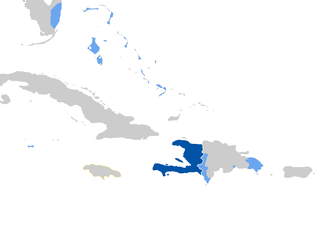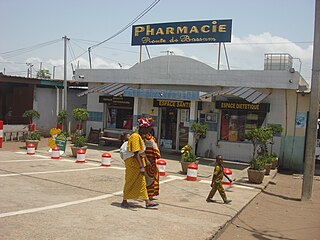
French is a Romance language of the Indo-European family. It descended from the Vulgar Latin of the Roman Empire, as did all Romance languages. French evolved from Gallo-Romance, the Latin spoken in Gaul, and more specifically in Northern Gaul. Its closest relatives are the other langues d'oïl—languages historically spoken in northern France and in southern Belgium, which French (Francien) largely supplanted. French was also influenced by native Celtic languages of Northern Roman Gaul like Gallia Belgica and by the (Germanic) Frankish language of the post-Roman Frankish invaders. Today, owing to the French colonial empire, there are numerous French-based creole languages, most notably Haitian Creole. A French-speaking person or nation may be referred to as Francophone in both English and French.

German is a West Germanic language in the Indo-European language family, mainly spoken in Western and Central Europe. It is the most widely spoken and official or co-official language in Germany, Austria, Switzerland, Liechtenstein, and the Italian province of South Tyrol. It is also an official language of Luxembourg and Belgium, as well as a recognized national language in Namibia. There further exist notable German-speaking communities in France (Alsace), the Czech Republic, Poland, Slovakia, Denmark, Romania and Hungary (Sopron).
Received Pronunciation (RP) is the accent traditionally regarded as the standard and most prestigious form of spoken British English. For over a century, there has been argument over such questions as the definition of RP, whether it is geographically neutral, how many speakers there are, the nature and classification of its sub-varieties, how appropriate a choice it is as a standard, and how the accent has changed over time. The name too is controversial. RP is an accent, so the study of RP is concerned only with matters of pronunciation, while other areas relevant to the study of language standards, such as vocabulary, grammar, and style, are not considered.

Quebec French, also known as Québécois French, is the predominant variety of the French language spoken in Canada. It is the dominant language of the province of Quebec, used in everyday communication, in education, the media, and government.

A double entendre is a figure of speech or a particular way of wording that is devised to have a double meaning, one of which is typically obvious, and the other often conveys a message that would be too socially unacceptable, or offensive to state directly.
Language education – the process and practice of teaching a second or foreign language – is primarily a branch of applied linguistics, but can be an interdisciplinary field. There are four main learning categories for language education: communicative competencies, proficiencies, cross-cultural experiences, and multiple literacies.
The imperative mood is a grammatical mood that forms a command or request.
In sociolinguistics, hypercorrection is the nonstandard use of language that results from the overapplication of a perceived rule of language-usage prescription. A speaker or writer who produces a hypercorrection generally believes through a misunderstanding of such rules that the form or phrase they use is more "correct", standard, or otherwise preferable, often combined with a desire to appear formal or educated.

Postal romanization was a system of transliterating place names in China developed by postal authorities in the late 19th and early 20th centuries. For many cities, the corresponding postal romanization was the most common English-language form of the city's name from the 1890s until the 1980s, when postal romanization was replaced by pinyin, but the system remained in place on Taiwan until 2002.

Belgian French is the variety of French spoken mainly among the French Community of Belgium, alongside related Oïl languages of the region such as Walloon, Picard, Champenois, and Lorrain (Gaumais). The French language spoken in Belgium differs very little from that of France or Switzerland. It is characterized by the use of some terms that are considered archaic in France, as well as loanwords from languages such as Walloon, Picard, and Belgian Dutch.

Haitian Creole, or simply Creole, is a French-based creole language spoken by 10 to 12 million people worldwide, and is one of the two official languages of Haiti, where it is the native language of the vast majority of the population. Northern, Central, and Southern dialects are the three main dialects of Haitian Creole. The Northern dialect is predominantly spoken in Cap-Haïtien, Central is spoken in Port-au-Prince, and Southern in the Cayes area.
The Mi'kmaq language, or Miꞌkmawiꞌsimk, is an Eastern Algonquian language spoken by nearly 11,000 Mi'kmaq in Canada and the United States; the total ethnic Mi'kmaq population is roughly 20,000. The native name of the language is Lnuismk, Miꞌkmawiꞌsimk or Miꞌkmwei. The word Miꞌkmaq is a plural word meaning 'my friends' ; the adjectival form is Miꞌkmaw.

Gallo is a regional language of eastern Brittany. It is one of the langues d'oïl, a Romance sub-family that includes French. Today it is spoken only by a minority of the population, as the standard form of French now predominates in this area.

African French is the generic name of the varieties of the French language spoken by an estimated 167 million people in Africa in 2023 or 51% of the French-speaking population of the world spread across 34 countries and territories. This includes those who speak French as a first or second language in these 34 African countries and territories, but it does not include French speakers living in other African countries. Africa is thus the continent with the most French speakers in the world, and African French speakers now form a large and integral part of the Francophonie.

The Flemish Community is one of the three institutional communities of Belgium, established by the Belgian constitution and having legal responsibilities only within the precise geographical boundaries of the Dutch-language area and of the bilingual area of Brussels-Capital. Unlike in the French Community of Belgium, the competences of the Flemish Community have been unified with those of the Flemish Region and are exercised by one directly elected Flemish Parliament based in Brussels.

Cameroonian Pidgin English, or Cameroonian Creole, is a language variety of Cameroon. It is also known as Kamtok. It is primarily spoken in the North West and South West English speaking regions. Five varieties are currently recognised:

Ghana is a multilingual country in which about eighty languages are spoken. Of these, English, which was inherited from the colonial era, is the official language and lingua franca. Of the languages indigenous to Ghana, Akan is the most widely spoken in the south. Dagbani, Dagare, Sisaala, Waale, and Gonja are among the most widely spoken in the northern part of the country.

Tayo, also known as "patois de Saint-Louis", is a French-based Creole spoken in New Caledonia. It is spoken by about 3000 people in the village of Saint-Louis, about 15 km (9.3 mi) from the New Caledonian capital Nouméa. The language developed out of the contact of speakers of many different Kanak languages in the mission, and the use of French for official purposes and as the language of prestige. The language contains structural elements primarily from Melanesian languages and lexical elements mainly from French.

Rosetta Stone Inc. is an American education technology software company that develops language, literacy and brain-fitness software. Best known for its language-learning products, in 2013, the company expanded beyond language into education-technology with its acquisitions of Livemocha, Lexia Learning, Fit Brains, and Tell Me More. In 2021, it became a subsidiary of IXL Learning.
Drug nomenclature is the systematic naming of drugs, especially pharmaceutical drugs. In the majority of circumstances, drugs have 3 types of names: chemical names, the most important of which is the IUPAC name; generic or nonproprietary names, the most important of which are international nonproprietary names (INNs); and trade names, which are brand names. Under the INN system, generic names for drugs are constructed out of affixes and stems that classify the drugs into useful categories while keeping related names distinguishable. A marketed drug might also have a company code or compound code.













